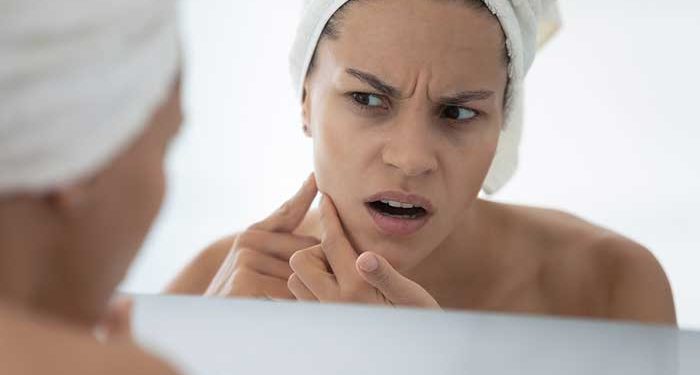Acne is never a welcome sight as it takes up residence on your face or elsewhere on your body. There is no cure for it. All you can do is try to control outbreaks and minimize the appearance of whiteheads, pimples, and scars.
In simple terms, acne occurs when hair follicles get plugged up with oil, dead skin cells, and other impediments. With millions of hair follicles on the human body comes millions of opportunities for clogs. And it can seem to be a never-ending battle if you are prone to acne.
As with most problems, grasping what causes them is part of the solution. It’s easy to know that you should wash your face when it’s oily and grimy. You’ve probably read about sebaceous glands, comedones, pustules, and papules ad nauseam.
But there may be some lesser-known reasons why you suffer from acne breakouts. Here are seven causes of acne you might have never considered.
1. Using the Wrong Acne Treatment
There’s a multitude of treatments for acne out there. They include everything from rubbing alcohol and witch hazel to serums made from stem cells. Every potion promises to be the answer to your acne issues. Yet over-the-counter cleansers, moisturizers, and remedies may not be tough enough.
If that’s the case, you’ll want to consult a healthcare provider to find the right acne treatment for you. Antibiotics, retinoids, spironolactone, or even birth control — or some combination thereof — could well provide the answer you’re seeking.
If what you’re using right now isn’t working as well as you hoped, ask questions. Be open to trying new solutions that may lead to clearer skin.
2. Letting Up When You’re Succeeding
You’ve experimented with a skincare routine that seems to be working. Perhaps your breakouts are less serious, less frequent, or nearly nonexistent. Obviously, you’re doing something right.
The inclination to sit back and relax when you experience success is human nature. Veni, Vidi, vici — now I deserve a break. If you have hit the sweet spot with your skincare routine, now is not the time to be lackadaisical.
Instead of letting up, lean in. Be consistent with the products you use, when you use them, and how. Your pores are adjusting to a clog-free existence, so don’t disappoint them.
3. Assuming Your Acne Is Always the Same
No doubt you’ve heard the saying that the only constant changes. This holds true for nearly everything in life, and your acne is no exception. Age, hormones, environment, and life, in general, change your skin and everything about it.
Many people develop acne during their teenage years, when hormones begin raging, and then grow out of it. If you’re one of those who continue to struggle with acne, you aren’t alone. You’ve aged out of the raging hormones stage, but now your acne is triggered by different things.
Revisit the products you use and the routine you follow as you get older. Your skin is getting drier, your diet is different, and your stressors have taken on a whole new meaning. Embrace and keep pace with the change.
4. Skipping Mindfulness
Stress doesn’t cause acne, but it can lead to breakouts. Stress causes the overproduction of hormones, like androgens and cortisol. It also leads to chemical changes that cause inflammation.
Mindfulness is the state of being fully present at the moment, eliciting calm, and eliminating feelings of being overwhelmed. As you might guess, mindfulness is an antidote to stress. The more mindful you are, the more relaxed you will feel, and that’s good for resolving whatever ails you.
You can even use your daily skincare routines as moments of mindfulness. Let go of the anger and anxiety toward your acne and give yourself up to the routine. Skipping the opportunity for mindfulness while relentlessly scrubbing your face will only make matters worse.
5. Touching Carelessly
Bacteria causes infections that, if located in your clogged pores, cause pimples. And since bacteria is pretty much everywhere, all the time, you need to take precautions. Touching acne-prone areas should be done with considerable care.
Every time your unwashed fingers or hands touch your face, you’re transferring bacteria. That cotton pillowcase under your cheek at night is chock full of bacteria-laden drool. So are dirty washcloths and towels you use to wash and dry your face.
Rather than being careless about what touches your face, be intentional. Make sure whatever comes into contact with it is either freshly clean or fights bacteria. Everyone needs a little human touch, but make sure it’s bacteria-free.
6. Avoiding Moisture
There’s a tendency to believe that moisture is a bad thing for acne-prone skin. If you think having dry skin will reduce your acne outbreaks, you’re incorrect. Dry skin leads to more of them, not fewer.
When your skin becomes dry, your body ramps up oil production, and you know what that does. Too much sun, too many astringent products, and too little moisturizer won’t just give you more blemishes. It will also give you even more flaky, dead skin cells that want to huddle in your pores.
You probably need to avoid moisturizers and makeup that contain oil. But there are plenty of non-comedogenic products that you can use to help keep skin moisturized without clogging pores. Your skin will thank you for it, both now and when you’re older.
7. Drinking Irresponsibly
If you suffer from acne, you may come to see “drinking irresponsibly” in a whole new light. Alcohol, particularly sweet mixed drinks, roils hormones and, as a diuretic, dehydrates you and your skin.
While alcohol contributes to outbreaks — some types more than others — it isn’t the only culprit. People don’t often think of milk as oily, but it is. Other beverages including soda, energy and sports drinks, coffee, juices, and lemonades may also cause breakouts.
So, what should you drink? Some herbal teas could be beneficial, but good old water is the best beverage of all. Seeing your skin clear up will leave you thirsty for more.
If you suffer from acne, you’re probably familiar with the common triggers of the condition. Looking at some uncommon causes may put your breakouts in a whole new light. This new perspective might help you find better ways to combat your acne and achieve clearer skin.





